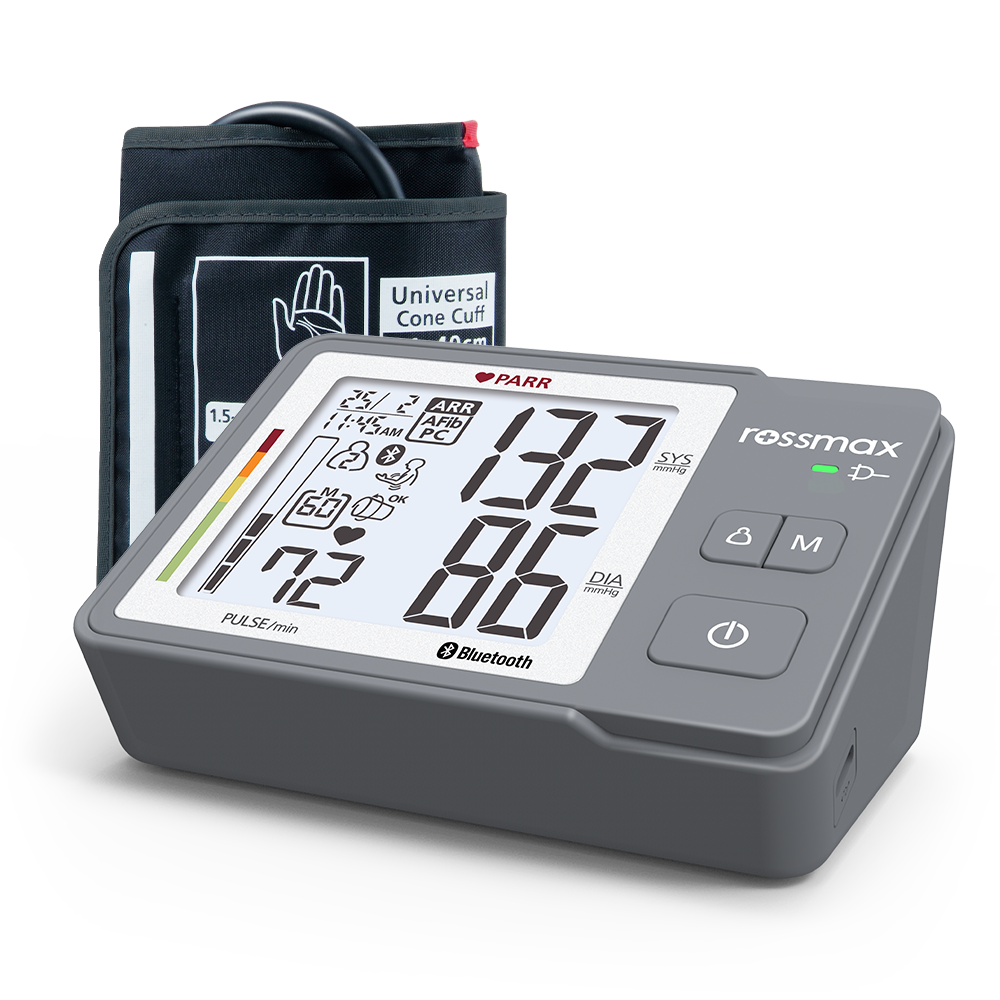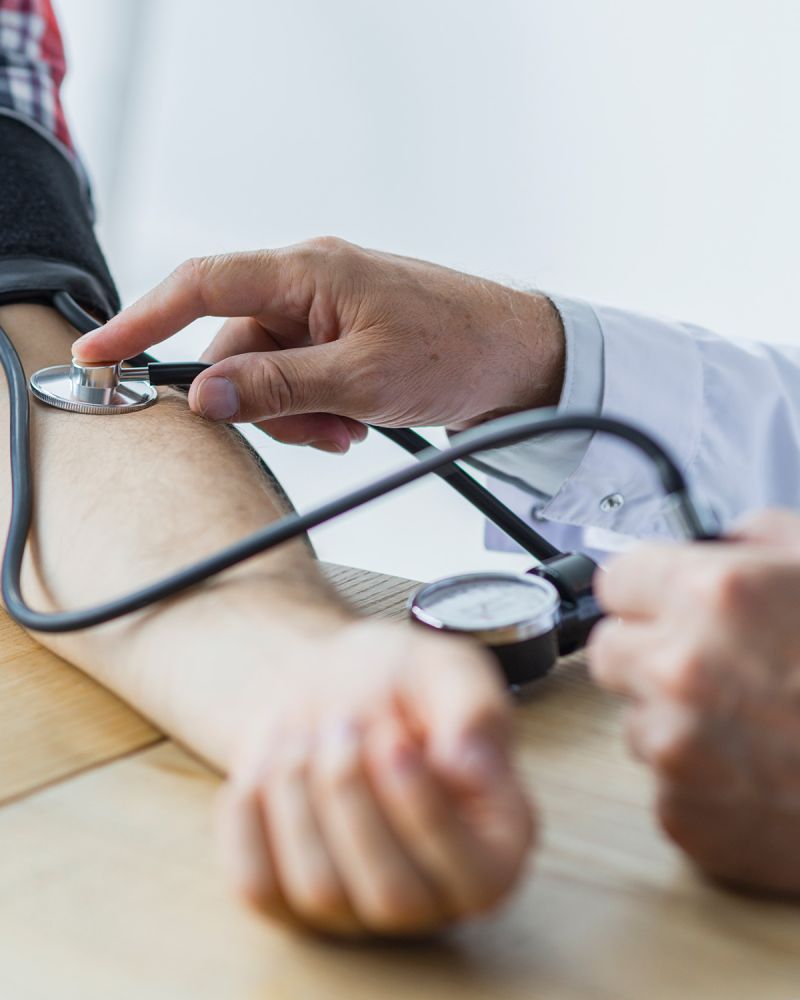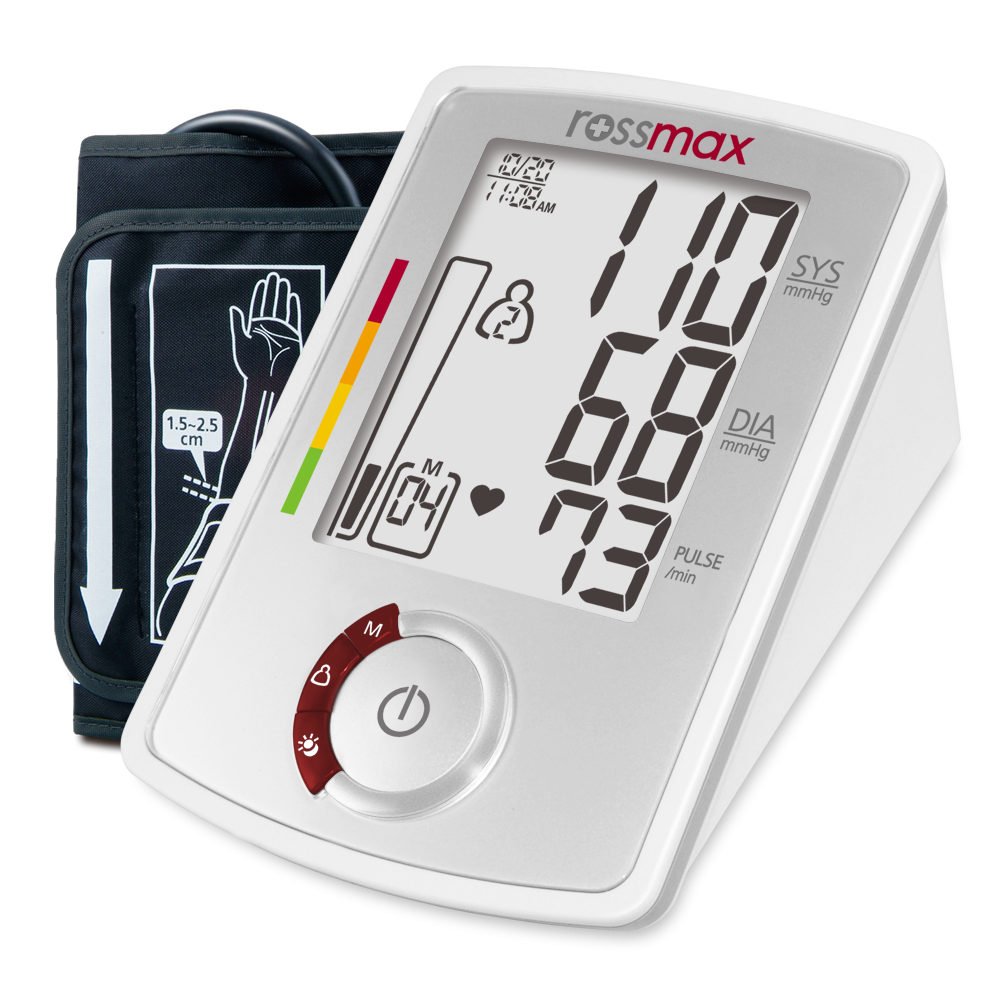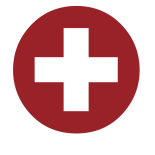High blood pressure should be treated in time
Start here!
High blood pressure damages arteries
High blood pressure should be treated in time - start here!
One in four Swiss of working age has high blood pressure. High blood pressure usually doesn’t feel like anything, so it can only be detected by measuring. High blood pressure damages arteries and strains the heart, and can pose serious health risks. Blood pressure is elevated when a reliable measurement results in an upper pressure of 140 or more or a lower pressure of 90 or more. The pressures describe the pressure inside the artery: the upper pressure during heart contraction and the lower pressure during resting heart. The upper pressure is also called systolic and the lower pressure is called diastolic pressure. The readings are given in millimetres of mercury, abbreviated in mmHg. Blood pressure is considered normal when it is less than 130/85 mmHg. Between normal and elevated blood pressure is considered satisfactory.

Rossmax Z5/X5 Blood Pressure Monitor
Detects arrhythmia in connection with quick and easy blood pressure measurement, and accurately distinguishes between atrial fibrillation and extra beats.
The prevalence of high blood pressure is increasing in those over 40 years of age. In young people it is rare and in middle-aged and elderly it is common. With age, the elasticity of the arteries decreases, and in a stiffer vein, the pressure increases higher as the heart works. High blood pressure means that the pressure in the arteries is constantly higher than normal.
Because blood pressure varies throughout the day in different situations, it is essential for reliable measurement results that the measurement is always done in the same way. A measurement period of 4 to 7 days is performed before the diagnosis of hypertension. In this case, the blood pressure is measured in the morning and in the evening, always 2-3 times at a time. A person's blood pressure is the average of these measurements.
Measuring and monitoring blood pressure is most reliable at home. Some people have clearly higher blood pressure as measured by a doctor, and other foreign measurement conditions can also raise blood pressure.
Measuring and monitoring blood pressure is most reliable at home. Some people have clearly higher blood pressure as measured by a doctor, and other foreign measurement conditions can also raise blood pressure.
Lifestyle-related hypertensive factors
What raises blood pressure?
High blood pressure is a lifestyle disease that is also affected by living standards. In a small number of cases, high blood pressure is caused by another disease, such as kidney disease. Lifestyle-related hypertensive factors include:

Eating a lot of licorice products can raise your blood pressure.
-
smoking
-
obesity, especially waist obesity
-
copious use of salt
-
little exercise
-
abundant use of NSAIDs
-
use of birth control pills or hormone replacement therapy
-
heavy alcohol consumption
-
abundant use of licorice products
-
prolonged stress
If you are overweight, you are three times more typical of high blood pressure than those of normal weight. Some people, on the other hand, have a hereditary predisposition to high blood pressure. Even with a normal weight, hereditary predisposition, especially when combined with stress, can raise blood pressure even if lifestyles are otherwise okay.
Treatment of high blood pressure
Why is it important to address high blood pressure in a timely manner?
High blood pressure is a major risk factor for cardiovascular disease, straining blood vessels, the heart and kidneys. If left untreated, it can cause coronary heart disease, strokes and heart attacks. In addition, the muscle of a constantly overloaded heart can thicken, resulting in heart failure.
High blood pressure strains blood vessels, the heart, brain and kidneys. Once high blood pressure is detected in health care, a risk assessment of cardiovascular disease is performed and it is determined whether the person has other risk factors for arterial disease. The risk of arterial disease is increased by e.g. smoking, high cholesterol and diabetes and other disorders of sugar metabolism. In healthcare, possible diseases that increase blood pressure can also be mapped. Treatment of high blood pressure significantly reduces the risk of cerebrovascular disorders - up to 40% in five years. Studies also show that people with normal blood pressure have fewer memory problems.
High blood pressure strains blood vessels, the heart, brain and kidneys. Once high blood pressure is detected in health care, a risk assessment of cardiovascular disease is performed and it is determined whether the person has other risk factors for arterial disease. The risk of arterial disease is increased by e.g. smoking, high cholesterol and diabetes and other disorders of sugar metabolism. In healthcare, possible diseases that increase blood pressure can also be mapped. Treatment of high blood pressure significantly reduces the risk of cerebrovascular disorders - up to 40% in five years. Studies also show that people with normal blood pressure have fewer memory problems.
Self-care is a key
You have the potential to affect your blood pressure
The person himself has a key role and opportunity to influence his own blood pressure, as lifestyles play a key role in the treatment of high blood pressure. Lifestyle changes are also needed during or at the start of medication: the effectiveness of medications is clearly improved when, at the same time, changes are made in nutrition, amount of exercise, or other crucial ways. With sufficient changes, it is possible to reduce the need for medication or even get rid of it completely.

Most of the salt is obtained by adding it to foods at the manufacturing stage.
Care for yourself
Self-care is a key and effective way to prevent heart death, stroke, heart failure, and dementia, among other things, so motivation is one of the most important decisions a person with high blood pressure can make.
Lower your blood pressure
Lifestyles are an integral part of treating high blood pressure
High blood pressure can be treated and prevented with lifestyle. Eating habits and lifestyles have a significant effect on blood pressure, and even small changes can have a beneficial effect.
To lower your blood pressure or prevent your blood pressure from rising, follow these steps:
-
Eat healthy: lots of vegetables, fruits and berries and soft fats instead of hard ones.
-
If you are overweight, try to lose weight: already 4-8% lower weight lowers your blood pressure by an average of 3-4 degrees.
-
If you smoke, quit or reduce: Quitting smoking is the most important way to reduce your risk of arterial disease.
-
Reduce salt: when you consume only 5 g of salt a day, the upper pressure drops by an average of 6 and the lower pressure by 4 notches. The Swiss get an average of 8.4 grams of salt and 6.1 grams a day of salt. 80% of the salt comes when added to foods during their preparation. Typical sources of salt are bread, cold cuts, cheese and ready meals.
-
More dietary fiber: a choice of fibrous breads, porridges and pastas and a colorful diet are worthwhile. By adding fiber to the diet, it is possible to reduce the upper pressure by an average of 6 and the lower pressure by 3 notches.
-
Add potassium and magnesium. You get potassium from vegetables, fruits and berries, for example.
-
Reduce alcohol: stop drinking heavily.
-
Exercise: Exercise promotes weight management, reduces stress and facilitates sleep. Exercise briskly for at least 30 minutes during the day, several times a week. Good forms of exercise include jogging or running, cycling, skiing and swimming.
-
Avoid stress: set aside time to calm down, learn mind control and pay attention to what is burdening you. How could you change the situation?
-
Treat temporary pain with paracetamol instead of NSAIDs.
800,000 Swiss use antihypertensive drugs
When high blood pressure is high, medication can be used in addition to lifestyle changes. Antihypertensives are intended for regular use and are often used for the rest of your life. Often two or three different drugs are needed to be taken at the same time. This is because lower doses of several drugs achieve better efficacy than high doses of a single drug. The doctor will plan the combination treatment and monitor its effectiveness.
There are many different types of antihypertensive drugs, and their choice is influenced by age and the person's other illnesses. More than half of the cases the blood pressure medication needs to be replaced within the first half of the year. It can therefore take months to find the right treatment.

Your doctor will plan your medication and monitor its effectiveness.
Antihypertensive drugs are intended for regular use
Your doctor will plan your blood pressure medication and monitor its effectiveness. Antihypertensive drugs are divided into five groups:
-
diuretics
-
beta-blockers
-
ACE inhibitors
-
ATR blockers
-
calcium channel blockers
The goal of drug therapy is to bring blood pressure below 140/90 mmHg. Diabetics and individuals who have had a heart attack or stroke may also be aiming for lower readings. Blood pressure readings should be monitored spontaneously at home at the beginning of treatment. Once the blood pressure is controlled, measuring once a month is enough.
Antihypertensive medication can also have beneficial effects in the treatment of other diseases. Sometimes antihypertensive drugs can also have adverse effects: for example, beta-blockers can be a poor choice for an asthmatic. Medication lowers pressure and reduces the risk of illness due to high pressure. However, it does not cure the causes of high blood pressure.
Regular measurements are necessary
Blood pressure monitoring is important for all adults
Since high blood pressure is not felt, every adult should know their own blood pressure. A good time to start monitoring your blood pressure is at about age 30. When blood pressure is normal, measurements every couple of years are sufficient. If the readings are close to the upper limit of normal, blood pressure should be measured once a year. Younger people typically get the first low pressure; in the elderly, on the other hand, the upper pressure easily rises too high.
Every adult should know their own blood pressure.
Monitor your situation if your close relative has high blood pressure, cardiovascular disease, and if you have diabetes, sleep apnea, or kidney or thyroid disease. Regular measurements are also necessary if you are overweight, smoke or drink a lot of alcohol.
For home measurements, it is essential to use a reliable and high-quality upper arm gauge. In the elderly, home measurements can be disrupted by common arrhythmias such as atrial fibrillation. In this case, the best choice is a blood pressure monitor that detects arrhythmias.
Validated Pregnancy Devices
High blood pressure during pregnancy
During pregnancy, 10–17% of expectant mothers develop high blood pressure. Blood pressure is monitored at the maternity clinic at each visit, as it may rise rapidly. Monitoring blood pressure during pregnancy is also important because high blood pressure can be the first signs of gestational poisoning that is dangerous to both mother and fetus. During pregnancy, high blood pressure is treated by resting and restricting the use of salt.

7 / 14 / 21 / 28 Day AM / PM Averaging
Rossmax AU941f - Validated Pregnancy Device
This blood pressure monitor has passed a clinical trial with 30 women in St. Joseph Hospital Cloppenburg according to BHS protocol.

